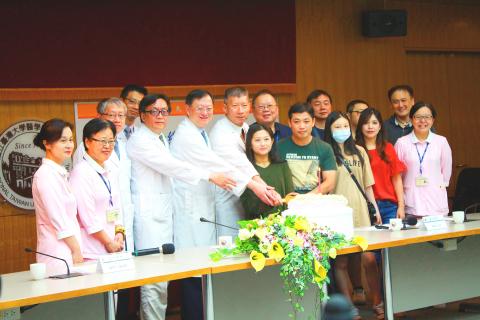National Taiwan University Hospital (NTUH) yesterday said that it has carried out a heart transplant on a woman whose heart had stopped beating 50 days before, marking a new record in the nation.
The 38-year-old woman surnamed Chen (陳) was in October last year stung by a bee while visiting Japan and she developed an acute fever and heart failure that led to cardiac arrest shortly after she returned to Taiwan.
The hospital immediately applied extracorporeal membrane oxygenation (ECMO) and waited for a suitable donor heart for transplant, as four available donor hearts were incompatible.

Photo: CNA
NTUH Cardiovascular Center director Chen Yih-sharng (陳益祥) yesterday said that the woman had acute myocarditis caused by an allergic reaction to the bee sting and her heart was barely beating when she was hospitalized.
After a cardiac ultrasound showed that her heart was hardly functioning, two ECMO systems were used to keep her alive while waiting for a transplant, he said.
She had complications — including acute kidney failure and small blood vessel blockage due to blood clots — during the wait, so the surgical team had to come up with a desensitization plan to remove harmful antibodies from her blood to reduce the risk of her body rejecting a transplant, he added.
“We had to use immunological methods to desensitize her body to reduce the risk of transplant rejection, but it was not totally without danger, because the use of immunosuppressive agents might lead to infections,” Chen Yih-sharng said.
A transplant was finally completed in December last year and the new heart has been functioning properly over the past six months, he said.
The woman could have had a stroke at any time during the waiting period and the surgical team had growing concerns that she would remain in a vegetative state even after the transplant, Chen Yih-sharng said, but added that she still demonstrated slight reactions, a computed tomography scan showed no cranial bleeding and her family was very supportive.
The woman yesterday said that at the time, she could hear sounds around her, but could not move her body.
Noting that at the time she needed transfusions of up to 3 liters of blood per day, she expressed gratitude to all involved in saving her life.
The woman’s husband, surnamed Chin (秦), said that at first, after being informed of the situation in the intensive care unit, he could not accept that his wife’s heart had stopped beating.
However, because he did not want to give up hope, he said that he visited and talked to her several times a day while she waited for a donor heart.
The average waiting period for a heart transplant at NTHU is about 40 days, Chen Yih-sharng said.
Family support was also very important, because it allowed the surgical team to put all their efforts into saving the woman, he added.

AIR SUPPORT: The Ministry of National Defense thanked the US for the delivery, adding that it was an indicator of the White House’s commitment to the Taiwan Relations Act Deputy Minister of National Defense Po Horng-huei (柏鴻輝) and Representative to the US Alexander Yui on Friday attended a delivery ceremony for the first of Taiwan’s long-awaited 66 F-16C/D Block 70 jets at a Lockheed Martin Corp factory in Greenville, South Carolina. “We are so proud to be the global home of the F-16 and to support Taiwan’s air defense capabilities,” US Representative William Timmons wrote on X, alongside a photograph of Taiwanese and US officials at the event. The F-16C/D Block 70 jets Taiwan ordered have the same capabilities as aircraft that had been upgraded to F-16Vs. The batch of Lockheed Martin

GRIDLOCK: The National Fire Agency’s Special Search and Rescue team is on standby to travel to the countries to help out with the rescue effort A powerful earthquake rocked Myanmar and neighboring Thailand yesterday, killing at least three people in Bangkok and burying dozens when a high-rise building under construction collapsed. Footage shared on social media from Myanmar’s second-largest city showed widespread destruction, raising fears that many were trapped under the rubble or killed. The magnitude 7.7 earthquake, with an epicenter near Mandalay in Myanmar, struck at midday and was followed by a strong magnitude 6.4 aftershock. The extent of death, injury and destruction — especially in Myanmar, which is embroiled in a civil war and where information is tightly controlled at the best of times —

China's military today said it began joint army, navy and rocket force exercises around Taiwan to "serve as a stern warning and powerful deterrent against Taiwanese independence," calling President William Lai (賴清德) a "parasite." The exercises come after Lai called Beijing a "foreign hostile force" last month. More than 10 Chinese military ships approached close to Taiwan's 24 nautical mile (44.4km) contiguous zone this morning and Taiwan sent its own warships to respond, two senior Taiwanese officials said. Taiwan has not yet detected any live fire by the Chinese military so far, one of the officials said. The drills took place after US Secretary

THUGGISH BEHAVIOR: Encouraging people to report independence supporters is another intimidation tactic that threatens cross-strait peace, the state department said China setting up an online system for reporting “Taiwanese independence” advocates is an “irresponsible and reprehensible” act, a US government spokesperson said on Friday. “China’s call for private individuals to report on alleged ‘persecution or suppression’ by supposed ‘Taiwan independence henchmen and accomplices’ is irresponsible and reprehensible,” an unnamed US Department of State spokesperson told the Central News Agency in an e-mail. The move is part of Beijing’s “intimidation campaign” against Taiwan and its supporters, and is “threatening free speech around the world, destabilizing the Indo-Pacific region, and deliberately eroding the cross-strait status quo,” the spokesperson said. The Chinese Communist Party’s “threats